Talking with Gabrielle Fulton was like connecting with a long-lost sister. While her roots are solidly Southern, she received degrees at Columbia U. and Northwestern, giving her an east coast and Midwestern sensibility— a kindred spirit and soul. Her play, Uprising, explores her family’s stories of ancestors picking cotton in the Georgia fields, and considers the impact of slave revolts on the lives of newly freed Africans. Set in the aftermath of John Brown’s Raid on the military arsenal at Harper’s Ferry, the play covers issues near and dear to my heart—I visited the historical site for the 150th commemoration—so of course I jumped at the chance to meet and talk with her.
The MetroStage production is dedicated to the memories of Sydney Chanele-Dawkins and Julian Bond, making the connection even more poignant in tackling the issues of slavery with spirit-filled fortitude.
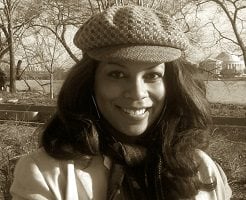

Gabrielle Fulton and I settled in a quiet corner office and discussed the rolling world premieres of her exciting new play, Uprising.
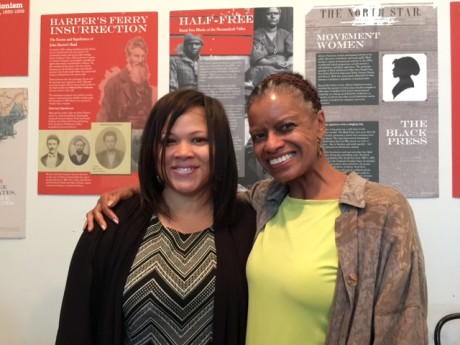
Debbie: You’ve described in various interviews how you came up with the ideas for the play, hearing the stories passed down through your family and weaving in historical elements. The importance of cotton is emphasized in the opening backdrop and to introduce the main characters. What’s the significance of the manual labor depicted by the endless cotton fields in establishing the characters?
Gabrielle: The stories of my great grandmother, as told by my grandfather, reflect that she was very proud that she could fill her sack and out-pick any man in the field. I wanted to honor that pride—it’s nothing to be ashamed of, that she was strong and extremely good at her job, committing herself to her work to be the best, even in picking cotton. It’s not the work that’s demeaning, but how people are treated and mistreated, and looked down upon because of their work that’s the issue. I had her in mind in writing about Sal.
The opening scenes set the characters in motion as a loving community, even joyful in their lot, all working together for the common good. Then a stranger comes along who, if he’s found, could jeopardize their lives with dire consequences. Who does Ossie represent?
One of the countless untold stories that fascinated me was that of Osborne Perry Anderson, the only African American to survive John Brown’s raid on Harper’s Ferry. I wanted to explore the dynamics of such an educated man of color, who was this militant abolitionist, and wondered what would happen if he expressed his thoughts about freedom, revolution and sacrifice to workers in the cotton field.
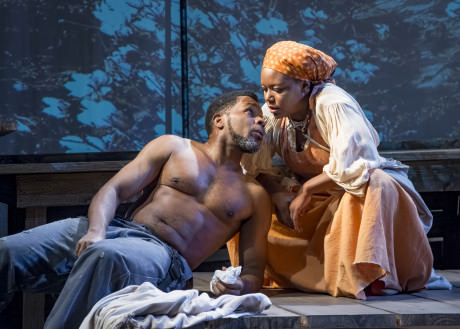
Ossie sets off sparks of distrust and fear within the group, but is appealing to Sal when he shows he can read, and Sal shares her dream of starting a school to teach youngsters to read. Your fascination with words and respect for education come through in the script.
Yes, words are powerful, and as a protagonist, can even lead to trouble. Ossie has a vision for his life, a plan, and he is determined to stay on course, even if he has to die fighting. The word “freedom” has enormous implications to all of the characters in the play, and also extends beyond to all of us personally in the present. I hope the audience will ask themselves– We’re free, what are we going to do with it?” Freedom takes courage and as Toni Morrison says in her latest novel, God Help the Child, it takes work, you have to be able to handle it.
You explore aspects of interior freedom in the script, including emotional freedom, and freedom from fear.
Yes, Sal has a breakthrough when she finally comes to a realization about her path and journey in life. She comes to a cross-road and has to decide which direction to take. When a tragic choice is an empowered choice is ultimately what we see in the play.
Sal eventually determined her own path instead of someone else’s, and once she’s resolved, a peace settled over her that she did what she had to do.
That was a turning point for her. Sometimes even someone who loves you can believe that they have a better dream for you than you have for yourself. Sal doesn’t allow fear to alter her life’s purpose.
As a Southern girl hearing your Grandparents’ stories over the years, you obviously have a connection to the spirit of the ancestors.
I hope to honor my ancestors who endured slavery. Although the characters in this play are emancipated or born free, I wanted to explore their interiors lives, give them depth, beyond being referred to as “slaves.” These were real people, with thoughts, beliefs, feelings and history. I want to relay a sense of personal identity and dignity to characters who were formerly enslaved Africans.
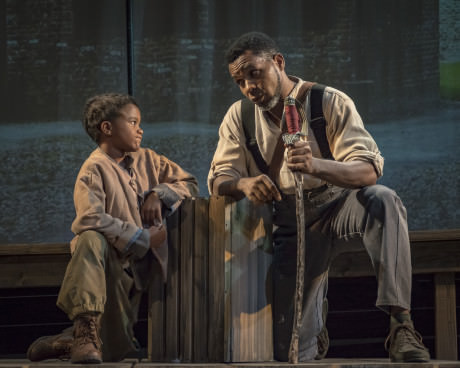
Why the term “enslaved Africans”? What’s the difference?
The generic term “slave” for example indicates ownership, a lowly social status with no recognition of the humanity or even the skills and abilities that Africans brought with them, and passed on to each other. These people were skilled craftsmen and women, with math and agricultural cultivation skills. They were builders, creators, herbalists and natural healers, and their contribution to building this country should be appreciated.
Having a youngster, “Freddie,” as one of the characters adds complication to casting and production, but you insisted on having that role. Why was that so important to you?
Well, his fate is central to the plot. But it’s important to pass on the stories, to show the legacy and strength of intergenerational relationship, to reclaim community. Also, while Freddie is not Sal’s child by blood, …”same family to we” is an expression that their relationship embodies. It’s a term that captures the strong desire within the African American community to create, claim and maintain a sense of familial ties despite having been considered chattel. Today’s much discussed “dysfunction in the black family” is part fiction because it’s based on a standard that is not necessarily our own but is a result of the deliberate and systematic destruction of families during slavery where families were torn apart. Even in their hardship, African-descent people maintained extended family that went beyond blood line.
In an interview I heard of the painter Jacob Lawrence – he choked up when describing the migration series, the depiction of the pain and suffering of the newly-released slaves floundering in a world full of abuse and neglect.
Yes, that pain is real, and is still there. The scars of slavery are in our DNA. You can see it in the struggles of the black community, the hurt, the self-destruction, and definitely the anger. It’s pent up, and there’s so much there because even after all these years, the issues are still affecting us and need to be dealt with in a real way. We have to metabolize the slavery past in this country, otherwise it just sits there and results in a sort of societal sickness.
What’s it like hearing the voices of your characters swirling in and through you over the years, and appreciating the hardship that our ancestors withstood?
I absolutely love connecting with my characters. They sustain and nourish me.
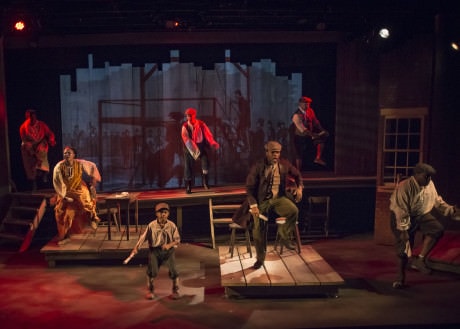
You seem to have a special connection to your characters.
Yes, I love, truly love listening to my characters and seeing how they play out in the two productions. As part of character exploration, I asked the actors how the play is impacting them. From my perspective, I have seen how the actors initially approach the text, memorize the script, get used to the lines and the blocking, and how they work on the play. Now, with this production at Metro Stage, they are internalizing the issues so intimately that the play is “working them.”
You mean where the issues kind of get under their skin and impact their own lives? That’s quite profound and shows the growth and continual progression of the characters. We all have the capacity, if only we would take the time and listen, right?
True, so true.
You’ve been working on this play for a number of years. How did you maintain a connection enough to the ancestors and history to relay their stories?
When it comes down to it, it’s a divine experience. It’s hard to describe but when I finally let myself get still, it’s like a power swept through me, something greater than me. The messages were so important, I had to let myself be open and allow the words to come through. Often, I felt like a vessel for the work to come through, to trust the Spirit and the work, to be open and let it flow, to tap into it. It sounds so simple…
But it’s not—I know! We’re so used to ripping and running and being in control, it’s hard and courageous to sit still and just be.
Yes, hard but so fulfilling, and can lead to amazing discoveries.
This is such an important work. Thank you so much for sharing it here.
I’m thankful and honored to be here, working with Thomas W. Jones II and Carolyn Griffin at Metro Stage, the entire creative production team, so close to the events of Harper’s Ferry, the Civil War monuments and other historical sites. The talkbacks have been great, the audiences seem engaged with the message and they ask insightful questions. Thanks for having me.
Uprising plays through October 25, 2015 at MetroStage – 1201 North Royal Street, in Alexandria, VA. For tickets, call the box office at (703) 548-9044, or purchase them online.
LINKS
Kim Moeller reviews Uprising on DCMetroTheaterArts.
Annetta Dexter-Sawyer reviews Uprising on DCMetroTheaterArts.
‘Uprising’ Plays September 17-October 25th at MetroStage as Part of The Women’s Voices Theater Festival.






I predict that Gabrielle Fulton, my home girl, will be the next great female Playwright and Poet!
We will speak her name along with legends such as Lorraine Hansberry, Pearl Cleage, Toni Morrison, Harper Lee and Margaret Mitchell! Her poetry will take your breath away!!!